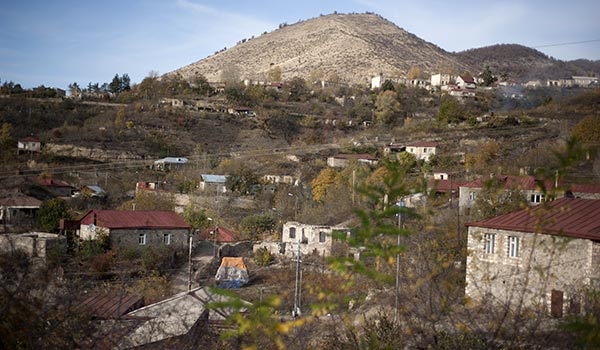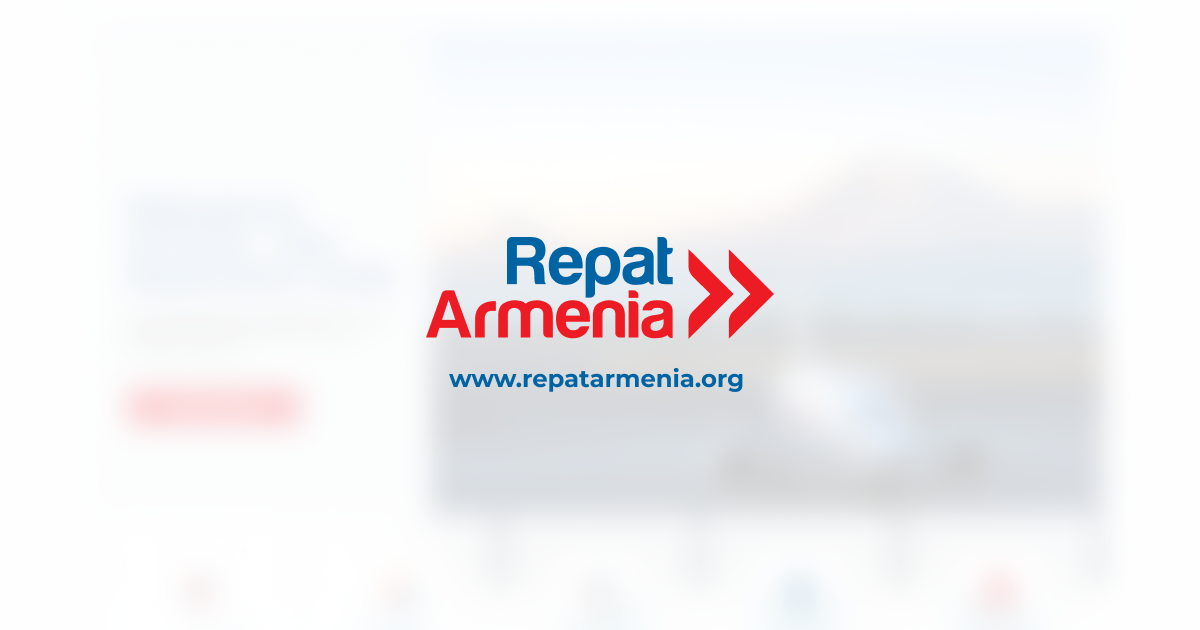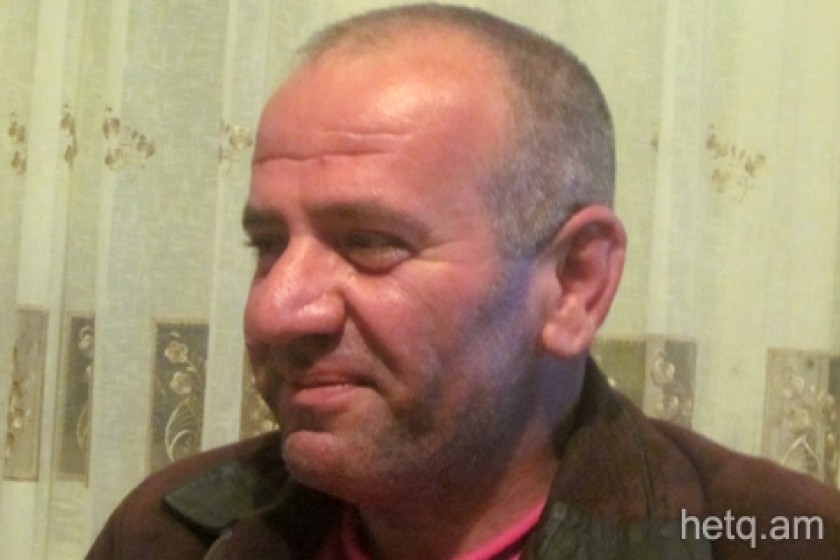Re: Life in Armenia
DEEP PURPLE'S IAN GILLAN IN ARMENIA
18:15 ~U 19.09.13
Deep Purple soloist Ian Gillan is in Armenia to attend the opening
of a renovated musical school in the second largest city of Gyumri.
Speaking to reporters on Thursday, the musician admitted that his
involvement in the project was very personalized and symbolic.
He said that the band came up with the idea after visiting the town
of Spitak in 1989, (a year after the devastating earthquake which
claimed thousands of lives, leaving lots of people homeless) and
realizing that life would be very difficult without music.
The soloist said it was very exciting for him to see the one-time
forlorn construction having changed new image. He said his central
role in both the band and the Rock Aid Armenia project had made the
renovation project possible. But he also admitted that the Armenians'
too, had their contribution.
Asked what made him choose especially Armenia among the many
disaster-stricken countries around the world, the musician said it
was a personalized initiative that made him spiritually bound to
the country.
Armenian News - Tert.am
Announcement
Collapse
No announcement yet.
Life in Armenia
Collapse
X
-
Re: Life in Armenia
ARMENIA IS THE REGIONAL LEADER AMONG INTERNET USERS
19:27, 3 September, 2013
YEREVAN, SEPTEMBER 3, ARMENPRESS: Armenia is the leader in South
Caucasus by internet usage indicators. About this fact speak the
results of The 2012 Caucasus Barometer research implemented by
"Caucasian Research Resource center" in Armenia, Georgia and
Azerbaijan. "Armenpress" reports that The 2012 Caucasus Barometer
research reveals that under half of each population uses the internet
once a week or more, and within that 33% of Armenians, 26% of Georgians
and 11% of Azerbaijanis use it every day. While internet use is more
common in Armenia, its usage has increased in all three countries since
2010. Additionally, internet use is more common among men than women,
among capital residents, and among those 18-35 years old.
Although internet usage is increasing in each country, over half
of each population does not use the internet. Lack of need for the
internet is the primary reason in Armenia and Azerbaijan, whereas lack
of access to a computer is the primary reason that people do not use
the internet in Georgia. Additionally, about a quarter of Azerbaijanis
indicate that they are not interested in using the internet (24%)
or have no way to connect (20%).
Those who use the internet were asked to name their most frequent
activities online. The majority of people in Georgia and about half
in Armenia and Azerbaijan mentioned social networking sites such
as Odnoklassniki, Facebook and Myspace. Searching for information
was also frequently mentioned, as was using Skype, particularly
in Armenia. The data also shows that Azerbaijanis more frequently
download, listen to and watch music and videos, as well as receive
or send emails than in their Caucasian neighbors. Other internet
activities such as playing online games, visiting dating websites,
blogging, shopping or engaging in forum discussions were not frequently
mentioned and thus remain less popular in the region.
Leave a comment:
-
Re: Life in Armenia
21 June 2013 Last updated at 10:03 ET
Sochi Olympics site worker 'tortured by Russian police'
The Russian authorities are investigating reports that an electrician working at a Sochi Winter Olympics site was tortured by police.
Martiros Demerchyan says he was detained and sexually assaulted with a crow-bar after he complained to his foreman that he had been underpaid.
His brother-in-law and fellow worker was also detained and beaten, but less seriously, Russian media report.
Russian police have frequently been accused of violence against detainees.
Two officers were jailed in the Republic of Tatarstan in September after a suspect was mortally wounded while being assaulted with a bottle.
'Beaten all night'
A huge building project is under way in the Black Sea region for the Sochi Winter Olympics, which are set to be the country's most high-profile international sporting event since the Moscow Summer Games of 1980.
Mr Demerchyan and his brother-in-law worked on a residential bloc for Olympic volunteers between 25 March and 16 May.
Each man had been promised 90,000 roubles (£1,780; $2,750) for the work but was given only 37,000, Mr Demerchyan's wife told Russian media.
When they complained, they were first threatened, then called to a meeting with the foreman on 12 June, she said. However, they found police officers there instead, and were taken to a police station, she added.
In custody, they were allegedly told to confess in writing to stealing building materials from the construction site.
Mr Demerchyan's wife said that when he refused, he was beaten all night by five policemen, losing some of his teeth. At one stage, he was assaulted with the crow-bar, she alleged.
He finally signed a blank piece of paper.
Mr Demerchyan was allegedly offered no medical treatment by the police. But on his way to court, he fell ill and police called an ambulance, Russia's NEWSru website reports.
He was treated in hospital, but doctors told his family they had found no serious injuries on his body.
Mr Demerchyan's wife has filed complaints against the police - for assaulting her husband and for failing to provide medical help, the Sochi 24 news agency reports.
A lawyer for Mr Demerchyan said he had worked on similar allegations from others detained at the same police station in the past.
Russia's Investigative Committee - its equivalent of the US FBI - is expected to decide within a month whether to take action against the police officers involved.
 The Russian authorities are investigating reports that an electrician working at a Sochi Winter Olympics site was tortured by police.
The Russian authorities are investigating reports that an electrician working at a Sochi Winter Olympics site was tortured by police.
__________________________________________________ _________________________________________
And this is the wonderful sochi that our compatriots are fleeing Armenia for
Leave a comment:
-
Re: Life in Armenia
U.S. Says Uzbekistan, Russia, Iran Worst For Human Trafficking
By Heather Maher
Last updated (GMT/UTC): 20.06.2013 18:28
WASHINGTON -- Uzbekistan and Russia have received the lowest possible rating from the U.S. State Department in its annual report on human trafficking around the world.
Along with Iran, the two countries received failing marks from Washington because their governments have not addressed -- and have no concrete plans to address -- the problem. As punishment, the United States could decide to withhold some types of foreign aid.
"We're not doing this not just to pass judgment on other people but because we know that we can advance this cause, we can make a difference," U.S. Secretary of State John Kerry said as he presented the report in Washington.
"We're going to keep working with [our] partners around the world in order to develop new approaches, new practices. And we're going to keep engaging with governments on this issue, because modern-day slavery affects every country in the world, including the United States, and every government is responsible for dealing with it, and no government is yet doing enough."
Forced labor remains the predominant human-trafficking problem in Russia, according to the report, which cites statistics from the Migration Research Center that show some 1 million people in the country are exposed to "exploitative" labor conditions, including the withholding of documents, nonpayment for services, physical abuse, and extremely poor living conditions.
Russia expressed "indignation" about the possibility of being hit by U.S. sanctions in connection with the views in the report, and China's Foreign Ministry described U.S. criticism of Beijing's record as biased, "unilateral," and "arbitrary."
READ MORE about Moscow and Beijing's reactions
In Uzbekistan, the report said, internal labor trafficking remains prevalent during the annual cotton harvest, in which children and adults are victims of government-organized forced labor.
'Depth Of The Challenge'
The U.S. ambassador for monitoring and combating human trafficking, Luis CdeBaca, said the number of convictions of criminals who force people into slavery increased in 2012.
"One of the successes is that the number of global convictions of human traffickers is up about 20 percent," CdeBaca said. "We were able to identify 4,746 convictions in the last year. As well, there was a continuation of an upward trend in the number of victims that are identified, to about 46,500. Unfortunately, 46,000 identified victims in a world in which up to 27 million people are enslaved shows the depth of the challenge that's ahead of us."
Countries that received the State Department’s second-worst rating include Afghanistan, Ukraine, Albania, Belarus, and Turkmenistan.
Those nations are on a "watch list" because although their number of trafficking victims is increasing, the governments are making significant efforts to combat the problem.
Plan In Afghanistan
Afghanistan remained on the watch list for a fourth consecutive year but was spared an automatic downgrade because its government has developed a plan to combat trafficking.
Internal trafficking of children is rife in Afghanistan, said the report, which documents their forced labor in the brick- and carpet-making industries, as domestic servants, beggars, sex slaves, and drug mules.
CdeBaca said Armenia earned the distinction of raising its rating.
"This year, Armenia was the Tier 2 country that moved up to Tier 1," he said. "We saw that on the basis of increased training, increased prosecutions, increased victim identification, and quite a bit of political will on the part of the Armenian government.”
Rated second-best were Azerbaijan, Bosnia-Herzegovina, Kosovo, Georgia, Iraq, Kazakhstan, Kyrgyzstan, Pakistan, Romania, and Tajikistan.
CdeBaca praised Iraqi Bassam al-Nasseri, saying he had helped rescue 35 Ukrainian and Bulgarian construction workers who had been stranded in Iraq after being trafficked and held in deplorable conditions.
Leave a comment:
-
Re: Life in Armenia
Garo and Mher: These Qamishli Armenians Plan to Stay in Kovsakan

It’s not only their accents that distinguish Syrian Armenians from local Artsakh residents. It’s also their viewpoints.
If locals resent the wealthy lifestyles of state officials, Garo Magaryan, who moved to Armenia seven years ago from the Syrian town of Qamishli, doesn’t seem to mind.
“So what if top Artsakh officials are engaged in business. What’s important is that they aren’t leaving the country and taking their money with them,” he says.
After moving, Karo spent two years in Stepanakert and later relocated to Ashtarak. Later on, he decided on Kovsakan (former Zangelan) in the extreme south of Artsakh’s Kashatagh Province.
His friend Mher Boghosyan, also from Qamishli, moved to Kovsakan three years ago.
Today, they jointly farm some 200 hectares of land. Most residents of Qamishli, on the Turkish border, are farmers as well.
I met Karo and Mher in Stepanakert.
Garo’s family is now living in Sweden. They will move to Kovsakan after Garo builds a house large enough for them all. Mher’s family, all seventeen of them, are waiting back in Qamishli. He says a spate of financial problems has delayed their move to Artsakh.
They both say one can live normally in Artsakh. It just takes hard work and perseverance.
Garo said he didn’t stay in Armenia because all the land is being privatized and fenced in. “In Armenia, you can’t sit down on a river bank and eat a bit of cheese and watermelon. It’s all posted land.”
He points out that a similar trend is evident in Kashatagh and that it must be countered. “The law in Artsakh is that if someone doesn’t farm their land, someone else can. If you work the land, it’s yours. If not, it doesn’t belong to you. I believe this principle is correct,” Garo says.
Garo says that everyone must do their bit to ensure that the rule of law is established in Artsakh and gives a personal example.
“Once, I was stopped by a traffic cop. He told me that he would fix my 10,000 fine if I paid him 3,000. I told him that if he did this I would lodge a complaint.”
Many Artsakh residents complain that they can’t pay off their loans by farming. Garo thinks differently. “There are those who receive loans and then spend the money foolishly, on drink, expensive clothes and other baubles. In the end, they’re in a bad way.”
Both Garo and Mher Boghosyan believe that the roads around Kovsakan need immediate attention. There’s also the matter of improving cell telephone reception and building a temporary shelter for arriving Syrian-Armenians in addition to a granary.
Karabakh Telecom still doesn’t provide telephone service in Kovsakan. “You often see people up in trees with their phones in order to link up with a service provider from Armenia. But their connection is very weak,” says Garo.
The two former Qamishli Armenians believe that a temporary shelter for 15-20 people would be a great help for others just arriving.
They say that more Armenians from Qamishli will come if the government continues to provide assistance.
Unlike Aleppo Armenians, those from Qamishli are quite used to village life, the two friends comment.
Garo and Mher say they have no plans to return to Qamishli because, whatever the outcome of the civil war in Syria, the border town won’t be the same.
“If the rebels win, they won’t forgive the Christians for siding with the government. It would be like moving to Baku and living amidst the Turks,” says Mher.
Robert Matevosyan, who heads the Kashatagh Repopulation Department, believes that new families will relocate to the area once houses envisaged for the Syrian Armenians are completed.
Right now, a building with 12 apartments is being built for them in Kovsakan.
There are 28 Syrian Armenian families now residing in Kovsakan; 74 individuals all together.
Leave a comment:
-
Re: Life in Armenia
Relocation With a Reason: Some Syrian-Armenian families find advantages to resettle in Karabakh

Numerous Syrian-Armenians have moved to Armenia because of the war in Syria, many among them further moved and have settled in the internationally unrecognized Nagorno Karabakh Republic’s Kashatagh region.
This southwestern part of Karabakh has now 23 Syrian families totaling 71 people. The first family moved there much earlier, in 2008, even before the war broke out. The majority of families migrated from northeastern Syrian Qamishli city on the border with Turkey.
Vardan Poghosyan's family is one of them. He moved to Kashatagh together with his wife and 18 month-old daughter. They live in the region’s capital Berdzor. Both are accountants and have jobs, and soon will be allotted an apartment.
“It was my decision to come directly to Karabakh. Rather than going to Europe or America, why not come and live in our homeland. Of course, there are many difficulties, but we have to endure. After all, we have lived in a foreign country more than enough,” Vardan, 29, told ArmeniaNow, adding that following their example his brother Serob, too, moved there with his family, in-laws and relatives.
Some of the Syrian-Armenian families live in Kovsakan, the second largest city, and Ishkanadzor of Kashatagh region. Robert Matevosyan, head of the re-settlement department of Kashatagh administrative district, says the first families who had moved to Kovsakan now have private houses, for the others a multi-storey building has been renovated and apartments have been allotted.
"In Berdzor they still live in the guesthouse, soon will have their own apartments provided to them free of charge with an ownership right. Those families that will adapt and stay, will later be given the property ownership certificate,” Matevosyan told ArmeniaNow. “People with professions are now employed, rural families have been given land lots. The state has granted agricultural loans with zero interest rate. People have sown wheat, oats, and will return the money when they harvest the crops.”
In 1992 (during the war) Armenian forces took control over Berdzor (Lachin) town and the Lachin corridor, which was also called the “road of life”, since it was the only land communication between Karabakh and Armenia. Zangelan, Kubatlu and part of Lachin (which are among the seven disputed regions around former Autonomous Republic of Nagorno Karabakh have been re-arranged into Kashatagh region with 3,376 sq.km total area, and the re-settlement of this area is of strategic importance. By the 2011 data of the NKR labor and social affairs ministry, 8,500 people reside in Kashatagh.
Matevosyan says they are expecting another stream of people to Kashatagh.
“We got the applications a while ago. Some 4-5 families have come to learn the terms. In any case we are ready to accept everybody. We continue building new houses and repairing the old ones. They adapt, live overcoming the challenges. There are language issues, but they are being overcome as well,” says Matevosyan.
Not only the NKR authorities, but also Kashatagh, the Tufenkian Foundation, Assistance to Self-Determined Artsakh charitable foundations are supporting the Syrian Armenians to settle in Karabakh, as well as Help Your Brother relief initiative for Syrian-Armenians.
According to Diaspora ministry data, some 6,000 families have moved to Armenia forced out by the military actions in Syria, 300 among them reside in the provinces of Armenia.
Leave a comment:
-
Re: Life in Armenia
 Explore the rich heritage and vibrant community of the Armenian Diaspora with Repat Armenia. Connect with your roots and discover opportunities to engage with Armenia.
Explore the rich heritage and vibrant community of the Armenian Diaspora with Repat Armenia. Connect with your roots and discover opportunities to engage with Armenia.
Home Internet Access in Armenia
RepatArmenia
Follow us on:
Home Internet Access in Armenia
Moving Forward
Home Internet Access in Armenia
In Armenia, 33% of adults in 2011 reported having home internet access, according to Gallup surveys conducted in 148 countries. This is by 1 percentage point more than the global average, which stands at 32% according to the same source.
It is important to understand, that the Gallup survey doesn’t reflect the internet penetration rate, because these results only reflect responses to the question — “Does your home have access to the Internet?” So it is possible that adults have access to the Internet through other means, including schools and universities, Internet cafes, and smartphones.
However, this is a very interesting survey with its Global reach. I’ve used the figures in the suvey to build the chart below.

Home Internet Access in South Caucasus acc. to Gallup
Hence, according to the Gallup survey, 29% of adults in Georgia and 15% in Azerbaijan said they have internet access at home.
Wordlwide, fewer than one in 10 respondents in 41 nations said they had Internet access in their home, including 0% in Burundi, Guinea, Mali, and Madagascar.
Access in Sweden and Singapore is highest worldwide, both countries are tied with 93% of residents reporting home Internet access, followed by Denmark and the Netherlands, where more than nine in 10 do.
DETERMINING INTERNET PENETRATION IN ARMENIA – A PROBLEM
Earlier this month the Armenian Government officially approved a method for determining the internet penetration rate in Armenia.
In the past, the data was collected by a methodology proposed by the International Telecommunications Union. Armenian government claims, that the ITU’s methodology is not accurate. In 2009 internet penetration was only 6.4% of Armenia’s population according to ITU. In 2011 and 2012, the ITU was using figures provided by Armenia’s Public Services Regulatory Commission. According to these figures, in 2010, Armenian internet users comprised 47.1% of the population; in 2011, this figure was 60.6%.
Caucasus Internet Access Infographic
The Caucasus Research Resource Center (CRRC) does alternative research to determine Armenia’s internet penetration rate. 44% of Armenia’s population was using the Internet in 2011 according to CRRC. Back in April 2012 American scholar and South Caucasus technology expert Katy Pearce had published a great infographic on internet penetration and usage in Armenia, as well as the other two South Caucasus countries.

BOOST IN INTERNET VIDEO
YouTube Internet Speed in Armenia
Even if I’m still not sure which figures to trust, it is clear, that internet penetration in Armenia is growing and surpassing the global averages.
Here you can see another chart taken from YouTube, showing, as prominent technology blogger Kornelij rightly noted, for the first time, that Armenia has surpassed the global average of accessing YouTube servers.
YouTube is the 3rd most popular website in Armenia (after Facebook and YouTube’s mothership Google) according to Alexa.com, so it seems, that YouTube is becoming a major competitor for the Armenian TV networks, which are already facing increased competition from online news portals.
Original Article
Leave a comment:
-
Re: Life in Armenia
Unfortunately the data for Armenian users of the Internet from the World Bank stops at 2009. From 2008 to 2009, population % of Internet users jumped from 6% to 15% in one year http://www.google.com/publicdata/exp...n_US&ind=falseOriginally posted by bell-the-cat View PostThis supposed improvement in speed is very sudden and very recent and has grown from a very low value that had been the normal value for a decade. This means that there is no proof it will be maintained and every reason to think it will not. It probably will not be maintained because even if the speed increase is down to a real increase in capacity, that increased capacity will encourage more people to use the interent and to use it in a more intensive way - so the capacity will be quickly used up and the speed will drop back to the old level.
A figure showing the % of the population that used the internet regularly would be more valuable. And what % have an internet connection at home. You can't say Armenia is way ahead if only 5% of its population uses the internet regularly while 80% of the population of Ireland or Italy use it regularly. And it is my experience in Turkey is that internet speeds are acceptably fast everywhere for basic internet usage - even in small towns. There is no data on that website for places in Armenia except for Yerevan. Gyumri isn't even mentioned.
I tried exploring other websites and found some website called Internet World Stats which seems like a marketing-oriented website or something... dunno if reliable. They claim 60.6% penetration of Internet in Armenia. Their claim that only 30,000 people in Armenia used it in year 2000 is in line with the World Bank figure though. http://www.internetworldstats.com/stats3.htm
Leave a comment:
-
Re: Life in Armenia
This supposed improvement in speed is very sudden and very recent and has grown from a very low value that had been the normal value for a decade. This means that there is no proof it will be maintained and every reason to think it will not. It probably will not be maintained because even if the speed increase is down to a real increase in capacity, that increased capacity will encourage more people to use the interent and to use it in a more intensive way - so the capacity will be quickly used up and the speed will drop back to the old level.Originally posted by Federate View PostNewest statistics on Internet download and upload speeds has been released and Armenia has seemingly made huge advances. 45th in the world in download speed (12.11 mbps) and 43rd in upload speed (3.98 mbps). We are way ahead of Turkey, Azerbaijan & Iran while Georgia has only a slightly higher speed. We are also surprisingly faster than such countries as Israel, New Zealand, Ireland, Italy etc.
Check out the list here: http://www.netindex.com/download/allcountries/
A figure showing the % of the population that used the internet regularly would be more valuable. And what % have an internet connection at home. You can't say Armenia is way ahead if only 5% of its population uses the internet regularly while 80% of the population of Ireland or Italy use it regularly. And it is my experience in Turkey is that internet speeds are acceptably fast everywhere for basic internet usage - even in small towns. There is no data on that website for places in Armenia except for Yerevan. Gyumri isn't even mentioned.Last edited by bell-the-cat; 01-16-2013, 08:29 AM.
Leave a comment:






Leave a comment: